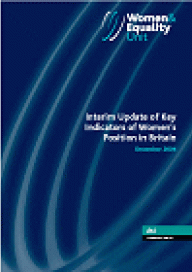Publications
 We author and publish a range of resources to keep you up to date with the latest developments in employment, labour market and human resource policy and practice.
We author and publish a range of resources to keep you up to date with the latest developments in employment, labour market and human resource policy and practice.
All our pdf publications are free to access.
Search results
-

Women in London's Economy
GLA | Dec 2005 | Greater London AuthorityThis research for the Greater London Authority (GLA) showed that by 2016, it was expected that women would fill seven out of ten new jobs in London, with an extra half a million jobs in the capital. The main key sectors for growth in women's employment during the decade were predicted to be in business service and also health, education, and retail. The GLA commissioned IES to carry out and report on the qualitative research detailed in this report.
-

What Employers Look for When Recruiting the Unemployed and Inactive
Skills, Characteristics and Qualifications
Newton B, Hurstfield J, Miller L, Page R, Akroyd K | Oct 2005 | Department for Work and PensionsThis study aimed to examine what employers seek when recruiting, and the extent to which government provision meets their needs. The focus was on unemployed and inactive adults aged between 16 and state pension age. A secondary aim was to explore whether there were differences in employers' requirements by age.
-

Evaluation of Care to Learn
Interim Report 2005
Dench S, Casebourne J | May 2005 | Department for Education and SkillsThis publication is no longer available. Care to Learn is a UK government initiative that provides financial support for teenage parents who want to continue in, or return to learning. It helps with the cost of their childcare and travel. This is the second in a series of reports designed to provide an evaluation of the first three years of Care to Learn. It focuses on the operation and impact of the initiative over the 2003-04 academic year.
-

Training a Mixed-Age Workforce
Practical Tips and Guidance
Newton B, Hurstfield J, Miller L, Bates P | Apr 2005 | Age Partnership Group, Department of Work and PensionsThis publication is no longer available. This project explored the barriers to training experienced by workers of different ages. The wider context for this research was the age discrimination legislation due to be implemented in October 2006. A key objective of this project was to address some of the myths and stereotypes that might deter employers from training their workers.
-

The Changing Role of Recruitment Intermediaries
Wolfe H, Hartley V | Mar 2005 | Institute for Employment StudiesThis research explores the role of recruitment intermediaries and some of the factors that are affecting them, alongside the changes in the recruitment market. Intermediaries face threats to business: the growth of e-recruitment and shared services in organisations, for example.
-
📄
Age Discrimination
the Issues for Employers
Hurstfield J, Akroyd K | Mar 2005 | Institute for Employment StudiesThis briefing, written in advance of the introduction of age discrimination legislation, provided an outline of the scope of the legislation on age discrimination and set out some of the key issues that employers should consider.
-

Fishing for Talent in a Wider Pool
Trends and Dilemmas in Corporate Graduate Recruitment
Barber L, Hill D, Hirsh W, Tyers C | Feb 2005 | Institute for Employment StudiesThis report presents the results from an audit of corporate graduate recruitment websites and 40 interviews in ten case-study organisations. The research examines whether graduate recruitment is meeting UK business needs and whether selection practices may discriminate against graduates from non-traditional backgrounds. It has key messages for employers, universities and careers advisors.
-

Recruitment and Retention of Teachers with Industrial or Professional Experience
Strebler M, Neathey F, Tackey N D | Feb 2005 | Learning and Skills Development AgencyThis is the report of the project on recruitment and retention of teachers with industrial experience and from other parts of the sector conducted on behalf of the Learning and Skills Development Agency (LSDA) by the Institute for Employment Studies (IES). The project aimed to investigate the strategies and practices used by colleges to attract, retain and develop teachers with current industrial experience or from other parts of the sector.
-
📄
Is Graduate Recruitment Meeting Business Needs?
An Audit of Recruiters' Websites
Hill D | Jan 2005 | Institute for Employment StudiesThis paper presents an audit of graduate recruitment websites that was jointly funded by IES Research Networks and the Council for Industry and Higher Education. Two students, one undergraduate and one postgraduate, conducted the audit to inform the research from graduates' perspectives. The Times Top 100 Graduates Employers polls UK students about who their ideal graduate employers are, then collates and showcases the results in a 'top' 100 ranking of graduate employers by their popularity among students. The web audit used this ranking to explore in more depth the qualities and characteristics of these organisations.
-

Interim Update of Key Indicators of Women's Position in Britain
Aston J, Clegg M, Diplock E, Ritchie H, Willison R | Dec 2004 | Women and Equality Unit, Department of Trade and IndustryIn November 2002, the Women and Equality Unit published Key Indicators of Women's Position in Britain (2002). It provided a set of key indicators across many aspects of women's lives, established benchmarks against which women's progress could be measured over time, and presented factual material to feed into public debate and policy-making. This report provides updates to the tables and figures presented in Key Indicators (2002), using the most recently available data at the time of writing. This publication is no longer available.
